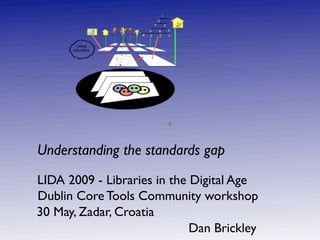
Understanding the Standards Gap
- 1. Understanding the standards gap LIDA 2009 - Libraries in the Digital Age Dublin Core Tools Community workshop 30 May, Zadar, Croatia Dan Brickley
- 2. Dublin Core RDF tools in theory & practice.... Standards Gap = what you want minus what you get What RDF’s standards do “out of the box” ...and what we have to build ourselves. A brief introduction to Semantic Web thinking, and a proposal for role of the DC Tools group
- 3. If you buy, install or build RDF/DC “standards-compliant” metadata tools, what’s still missing? how to fill that gap? Two conceptual tools: 1. Understand the RDF & Semantic Web style - lnformation-linking using Web technology 2. Understand Dublin Core history: DC as element set vs DC as a community meeting place - from 15 DC metadata elements as ‘the’ solution, to DC community as place to share & find solutions
- 4. The Semantic Web project A true story about linked information systems: From many small pieces of information (“claims”)... ...to the total universe of information (“The Web”).
- 5. Claims? as properties, relationships and attributes... #me name ‘Dan Brickley’ #me mbox danbri@danbri.org #me workplaceHomepage http://www.vu.nl/ #me currentProject http://notube.tv/ #me workplaceHomepage http://www.fao.org/ #me currentProject http://www.fao.org/agris/ #me currentProject http://www.foaf-project.org/ #me homepage http://danbri.org/ #me interest http://www.dublincore.org/ #me interest http://www.w3.org/ #vu homepage http://www.vu.nl/ #vu type Organization #vu name ‘Vrije Universiteit Amsterdam’ #me type Person http://www.dublincore.org/ type Document #me schoolHomepage http://hginfant.schoolwebbuilder.co.uk/ #me schoolHomepage http://www.westergate.w-sussex.sch.uk/ #me schoolHomepage http://www.bristol.ac.uk/ W3C Resource Description Framework (RDF): simple factual claims in the Web. (Q: are these claims useful for anything unless you know who made them?) (Q: how do these claims relate to documents? to their creators? to hyperlinks? provenance?)
- 6. The world according to a document: claims as triples
- 11. Acronym Guide part 1: RDF/XML, RDFa, GRDDL, N3/Turtle standards These are all ways of encoding simple 3-part claims in various Web documents. That is all that they do. So different documents can make different claims? Yes.
- 13. What the computers see... 3 sets of claims
- 14. Acronym Guide part 2: SPARQL - an RDF query language SPARQL lets you ask factual questions against a database of these claims. That is all that it does. And the queries can talk about who made each claim? Yes.
- 15. PREFIX : <http://xmlns.com/foaf/0.1/> SELECT ?x WHERE { GRAPH <http://localhost/notube/layerlist.rdf> { <http://localhost/notube/layer1.rdf#alice> :made ?byalice . } GRAPH ?byalice { <http://localhost/notube/layer1.rdf#alice> :schoolHomepage ?x . } } What school does Alice say she went to? PREFIX : <http://xmlns.com/foaf/0.1/> SELECT ?g ?who WHERE { GRAPH <http://localhost/notube/layerlist.rdf> { ?who :made ?g . } GRAPH ?g { <http://localhost/notube/layer1.rdf#alice> :schoolHomepage <http://lookingglass.example.org/> . } } Who has something to say about Alice’s schooling? - does Alice’s school agree that she attended it? Does Bob’s? - when sources disagree, how to prioritise? who to believe? This is RDF’s approach - understand it and you’ll understand what you get from RDF tools, RDF data, RDF people...
- 16. Linking claims with topics, authentication & authenticity.... prospects.html dc:title quot;Oil investigation - early findingsquot; prospects.html dc:creator person1 prospects.html rdf:type Document person1 foaf:name quot;John Smithquot; prospects.html dc:subject sub1 person1 foaf:workplaceHomepage <http://mining_company.example.com/> person1 foaf:schoolHomepage <http://miningschool.example.org/> person1 foaf:openid <http://miningschool.example.org/jsmith> person1 rdf:type Person sub1 rdf:type Concept sub1 skos:prefLabel quot;OFFSHORE DRILLING (MINING EXPLORATION)quot; sub1 skos:notation “62.001.4(26)” (UDC/lonclass) sub2 skos:preLabel quot;INDUSTRIAL TESTINGquot; sub2 skos:notation quot;62.001.4quot; (UDC/lonclass) sub1 skos:broader sub2 SKOS in the Web: each concept gets a page... SKOS is a set of terms for making claims about subjects/topics, their properties and relationships. (Q: how might employers, academia or individuals use it to make Web-based claims about expertise?)
- 17. Beyond Toy Examples Each Library of Congress Subject Heading has an RDF/SKOS page ... 6.5M bib records, ~200k auth records Swedish Union Catalog Many thesauri. All of Wikipedia (dbpedia.org). Yahoo & Google. From http://www.gutenberg.org/wiki/Gutenberg:Feeds <dc:subject> <rdf:Bag> <rdf:li><dcterms:LCSH><rdf:value>Epic poetry, Greek -- Translations into English</rdf:value></dcterms:LCSH></rdf:li> <rdf:li><dcterms:LCSH><rdf:value>Achilles (Greek mythology) -- Poetry</rdf:value></dcterms:LCSH></rdf:li> <rdf:li><dcterms:LCSH><rdf:value> Trojan War -- Poetry</rdf:value></dcterms:LCSH></rdf:li> </rdf:Bag> </dc:subject> To using “http://id.loc.gov/authorities/sh2007100520”
- 18. DC Tools Community People care about metadata standards for many reasons: - long term archival - integration with other collections - lower cost of systems development - reduce lock-in to commercial or opensource systems - potential for alternative UIs - consistency of interface for users None of us get all we need from off-the-shelf tools...
- 19. So ... DC tools & the standards gap... (the difference between what you want and what you get...) Typical RDF off-the-shelf toolkit offers: Parsers, XML & SQL mappings, query and rule systems, databases. That’s about it. But solid, standardised, well understood and with many independent implementations... What more could you want?
- 21. Under development... (wishlists!) Full text search, autocompletion systems, sophisticated ranking algorithms, tagging, search and browse interfaces. Tools to check and validate conformance to ‘application profiles’ (ie. particular patterns of descriptions & claims). Conversion and mapping tools. Analytics. Stats. Tools that compensate for inconsistent, semi-chaotic data. Tools that help authors and publishers.[...] ... & .... documents that describe the available tools and their use cases. Dublin Core is not a technical answer to all questions, but a place where practitioners can share answers, experiments, ideas...
- 22. Back to the future? TODO.txt 1. (re-)read “Information Management: A Proposal” (TimBL, 1989) 2. Document your own standards gap in the DC Tools community: what do you need that isn’t ready yet? What have you tried? What works, what doesn’t?
- 23. Questions? mailto:danbri@danbri.org
